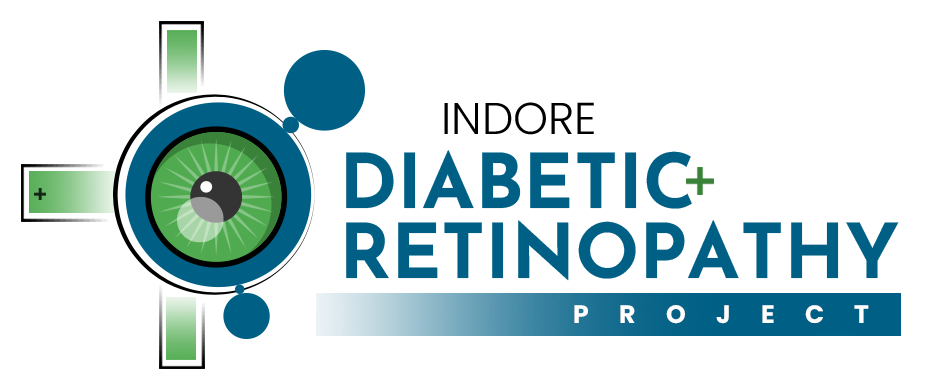RETINOPATHY OF
PREMATURITY(ROP)
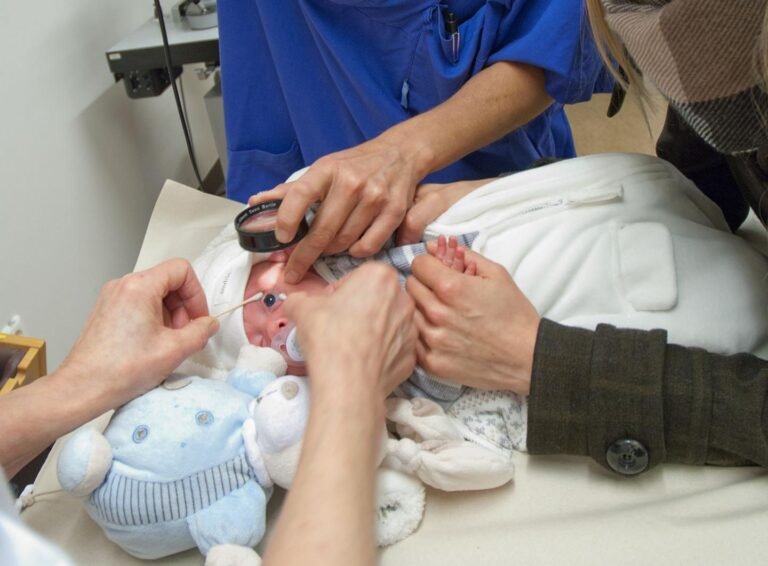
Best Eye Surgical Treatment in Indore
Retinopathy of Prematurity (ROP) screening In Indore
Retinopathy of prematurity (ROP) is a disease that occurs in premature babies. It causes abnormal blood vessels to grow in the retina, the layer of nerve tissue in the eye that enables us to see. This growth can cause the retina to detach from the back of the eye, leading to blindness.
Some cases of ROP are mild and correct themselves, but others require surgery to prevent vision loss or blindness. Surgery involves using a laser or other means to stop the growth of the abnormal blood vessels, making sure they don’t pull on the retina. The inside of the eye, the retina is not fully developed in premature babies. Abnormal blood vessels can develop in such a retina. These abnormal blood vessels can cause internal bleeding and even retinal detachment. This is called Retinopathy of Prematurity (ROP). This condition results in low vision or blindness – both of which are irreversible.
Blood vessels grow from the center of a developing baby’s retina 16 weeks into the mother’s pregnancy, and then branch outward and reach the edges of the retina 8 months into the pregnancy. In babies born prematurely, normal retinal vessel growth may be disrupted and abnormal vessels can develop, which can cause leaking and bleeding in the eye. ROP can stop or reverse itself at any point, so it often resolves as the baby grows. Sometimes, though, the disease may progress to cause scarring, which pulls the retina away from the rest of the eye. ROP has no signs or symptoms. The only way to detect it is through an eye examination by an ophthalmologist.
Best Eye Surgical Treatment in Indore
If admission to the hospital isn’t necessary, you’ll be able to take your child home about an hour after the procedure. Follow-up care for ROP surgery includes giving your child eye drops (to prevent infection) for at least a week.
To make sure the eyes are healing properly and that ROP hasn’t returned, eye exams should be scheduled based on instructions from the ophthalmologist. This is usually every 1-2 weeks. For scleral buckling, the ophthalmologist must examine the buckle every 6 months to account for your child’s growing eye. The goal of surgery for retinopathy of prematurity is to stop the progression of the disease and prevent blindness. Although ROP surgery has a good success rate, not all babies respond to treatment. Up to 25% of babies who have ROP surgery might still lose some or all vision.
Keep in mind that for all types of ROP surgery, a degree of your child’s peripheral (side) vision will be lost. And even if the ROP has stopped progressing, vision still can be affected. Since some vision loss and complications can occur, any child who has had ROP surgery should have regular, yearly eye exams well into adulthood.
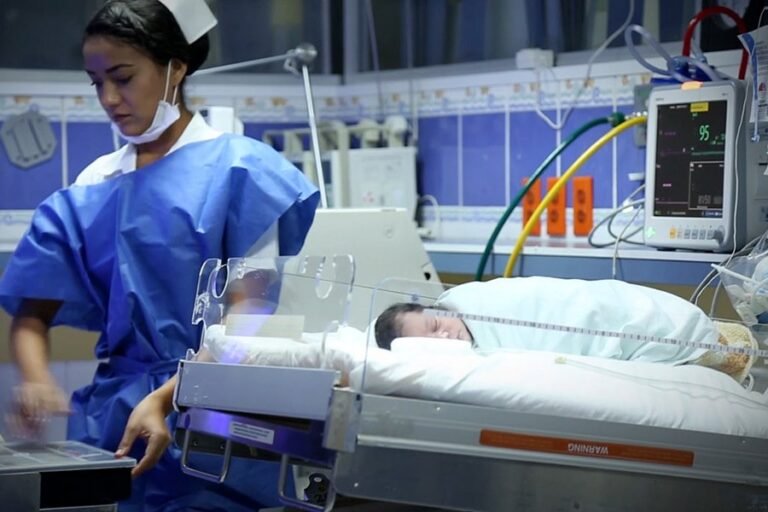
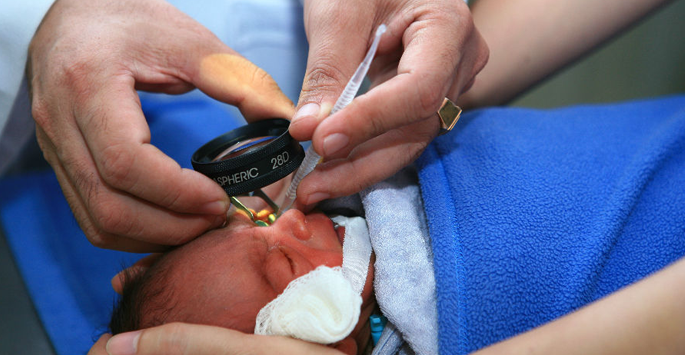
Best Eye Surgical Treatment in Indore
ROP surgery is used to stop the growth of abnormal blood vessels by focusing treatment on the peripheral retina (the sides of the retina) to preserve the central retina (the most important part of the retina). ROP surgery involves scarring areas on the peripheral retina to stop the abnormal growth and eliminate pulling on the retina.
Since surgery focuses treatment on the peripheral retina, these areas will be scarred and some amount of peripheral vision may be lost. However, by preserving the central retina, the eye will still be able to perform vital functions like seeing straight ahead, distinguishing colors, reading, etc. The most frequently used methods of ROP surgery are:
- laser surgery
- cryotherapy
For more-advanced cases of ROP where retinal detachment has occurred, these methods are used:
Retinopathy of Prematurity (ROP)
At Retina Specialty Hospital, we offer a full range of eye care services, including:
– eye exams
– Diagnosis and treatment of vitreo-retinal disorders
– Cataract surgery
– Glaucoma management
– Corneal and refractive surgery
– Pediatric eye care
– Low vision rehabilitation
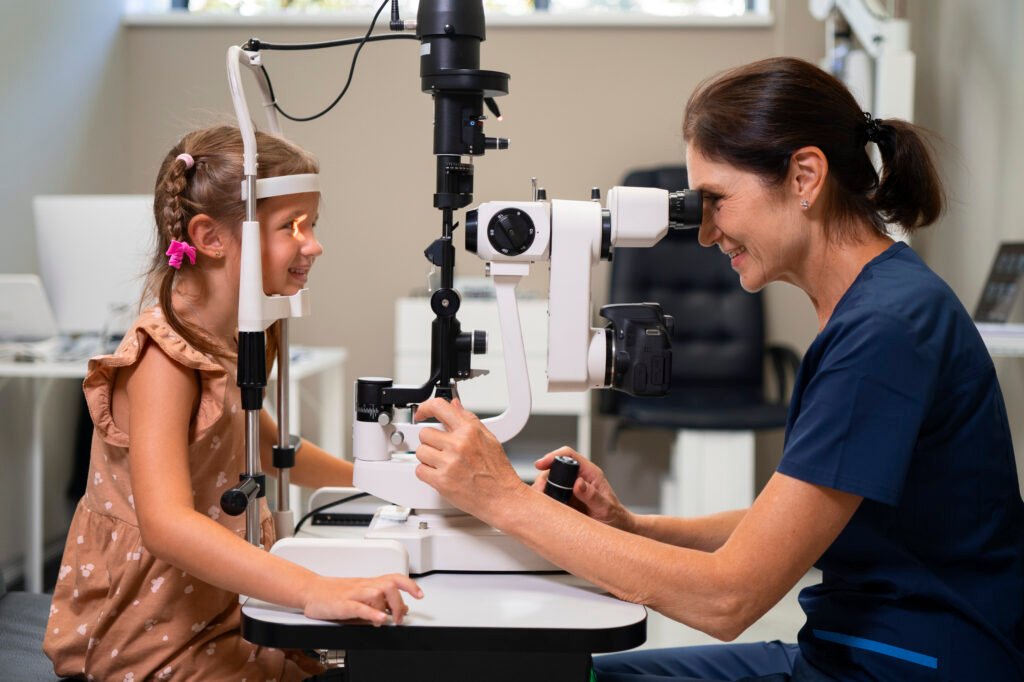
Diagnostic Services
Our hospital is equipped with the latest diagnostic technology, including advanced imaging techniques, to ensure accurate and timely diagnosis of eye-related conditions. Our team of ophthalmologists and technicians work closely to provide a thorough assessment of each patient’s needs, allowing for personalized treatment plans.
From routine eye care to complex surgical interventions, Retina Specialty Hospital offers a wide range of treatment services to address various eye health concerns. Our experienced team of specialists utilizes the most up-to-date medical practices and technologies to deliver the highest quality of care to our patients.
In addition to our clinical services, Retina Specialty Hospital also provides a range of supportive services to ensure the well-being of our patients. These include:
– Patient education and counseling
– Vision rehabilitation and low vision aids
– Financial assistance programs
– Coordinated care with primary care providers
At Retina Specialty Hospital, we believe that everyone deserves access to quality eye care. That’s why we are committed to providing affordable and accessible services to our patients, regardless of their financial circumstances. We work closely with insurance providers and offer various payment options to ensure that our patients receive the care they need without financial burden.
Retina Specialty Hospital is located at 312,324-325, Scheme-54 , PU4, Opposite Medanta Hospital Rasoma Square, AB Rd, Indore, Madhya Pradesh 452001 , Indore, Madhya Pradesh. Our facility is easily accessible by public transportation and has ample parking available for our patients and visitors.
If you have any questions or would like to schedule an appointment, please don’t hesitate to contact us:
FAQs About ROP Screening
If a baby has ROP, it can lead to abnormal blood vessel growth in the retina, which can cause the retina to detach. This can result in vision problems and, in severe cases, complete vision loss. ROP requires close monitoring and prompt treatment to prevent these complications.
ROP cannot be completely "cured," but it can be effectively managed and treated. With early detection and appropriate treatment, the progression of ROP can often be halted or reversed, allowing for the preservation of vision. However, in some cases, the damage to the retina may be irreversible, leading to permanent vision impairment.
ROP is classified into 5 stages:
- Stage 1: Mild abnormal blood vessel growth
- Stage 2: Moderate abnormal blood vessel growth
- Stage 3: Severe abnormal blood vessel growth with risk of retinal detachment
- Stage 4: Partial retinal detachment
- Stage 5: Total retinal detachment
ROP is diagnosed through a comprehensive eye examination performed by a qualified ophthalmologist. This typically involves dilating the baby's pupils and using specialized imaging techniques, such as ophthalmoscopy, to closely examine the retina and assess the extent of any abnormal blood vessel growth or other signs of the condition.
The main cause of Retinopathy of Prematurity (ROP) is premature birth, which disrupts the normal development of blood vessels in the retina.









